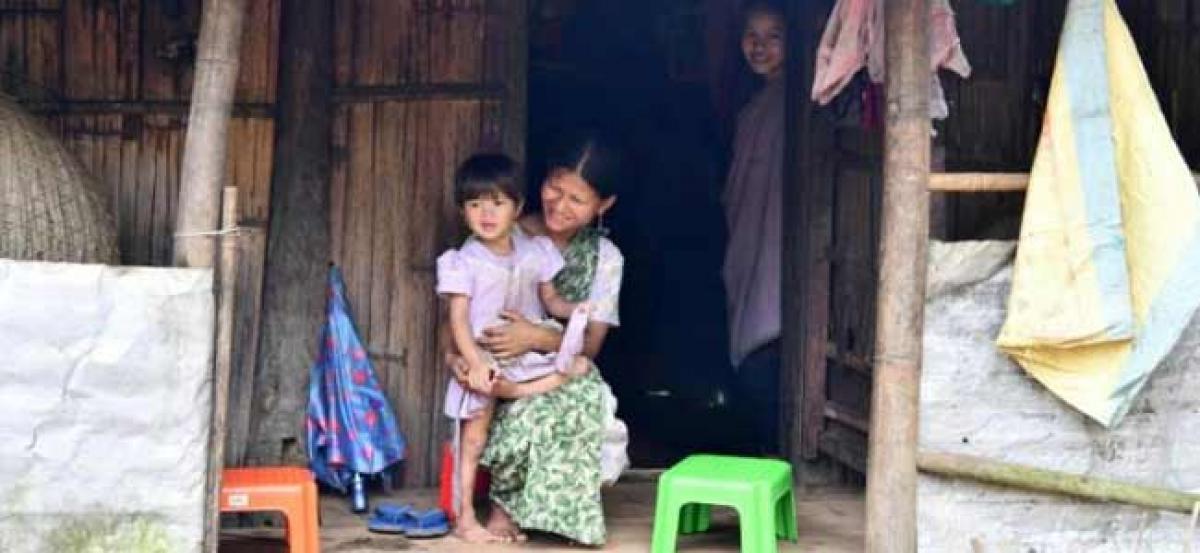Live
- Harish Rao to Visit Medak Today for Centenary Celebrations
- Irregularities in TUDA under vigilance scanner
- ‘Pushpa-2’ row: Celebs & politicos fail to act fairly
- Learn from fighting spirit of women bravehearts: VHP VP
- BJP MP Arvind, MLA Sanjay Kumar meet CM Revanth
- Rapido partners with L&TMRHL to provide discounted rates
- Kisan Diwas 2024: A Day Dedicated to honor our Farmers.
- Axed ACP takes the wind out of Pushpa hero’s sails
- Tender apology to CM, mantri tells Allu Arjun
- CM condemns attack on Allu Arjun’s house
Just In

Curious whistles and chirrups echo through the jungle around Kongthong, a remote Indian village, but this is no birdsong Its people calling out to each other in music an extraordinary tradition that may even be unique
Shillong: Curious whistles and chirrups echo through the jungle around Kongthong, a remote Indian village, but this is no birdsong. It's people calling out to each other in music -- an extraordinary tradition that may even be unique.
Here in the lush, rolling hills of the northeastern state of Meghalaya, mothers from Kongthong and a few other local villages compose a special melody for each child.
Everyone in the village, inhabited by the Khasi people, will then address the person with this individual little tune -- and for a lifetime. They have conventional "real" names too, but they are rarely used.
To walk along the main road in this village of wooden huts with corrugated tin roofs, perched on a ridge miles from anywhere, is to walk through a symphony of hoots and toots.
On one side a mother calls out to her son to come home for supper, elsewhere children play and at the other end friends mess about -- all in an unusual, musical language of their own.
"The composition of the melody comes from the bottom of my heart," mother-of-three Pyndaplin Shabong told AFP.
"It expresses my joy and love for my baby," the 31-year-old said, her youngest daughter, two and a half years old, on her knee.
"But if my son has done something wrong, if I'm angry with him, he broke my heart, at that moment I will call him by his actual name," rather than singing lovingly, said Rothell Khongsit, a community leader.
Harmony with nature
Kongthong has long been cut off from the rest of the world, several hours of tough trek from the nearest town. Electricity arrived only in 2000, and the dirt road in 2013.
Days are spent foraging in the jungle for broom grass -- the main source of revenue -- leaving the village all but deserted, except for a few kids.
To call out to each other while in the forest, the villagers would use a long version lasting around 30 seconds of each other's musical "name", inspired by the sounds of nature all around.
"We are living in far-flung villages, we are surrounded by the dense forest, by the hills. So we are in touch with nature, we are in touch with all the gracious living things that God has created," says Khongsit.
"Creatures have their own identity. The birds, so many animals, they have ways of calling each other."
The custom is known as "jingrwai lawbei", meaning "song of the clan's first woman", a reference to the Khasi people's mythical original mother.
And unusually for India, this is a matrilineal society. Property and land are passed down from mother to daughter, while a husband moves in with his wife and takes her name.
"We consider the mother the goddess of the family. A mother looks after a family, after the inheritance we get from our ancestors," Khongsit said.
Modern world
But according to anthropologist Tiplut Nongbri, a professor at Jamia Millia Islamia university in Delhi, it is something of a "disguised patriarchy".
Women "don't have decision-making powers. Traditionally, they can't take part in politics, the rules are very clearly demarcated between male and female," she told AFP.
"Taking care of the children, that's the women's responsibility. Statecraft and all that is (a) male function."
The origin of "jingrwai lawbei" isn't known, but locals think it is as old as the village, which has existed for as long as five centuries.
The tradition's days may be numbered, though, as the modern world creeps into Kongthong in the shape of televisions and mobile phones.
Some of the newer melodic names are inspired by Bollywood songs.
And youngsters are increasingly going off singing out their friends' melodic names, preferring instead to phone them.

© 2024 Hyderabad Media House Limited/The Hans India. All rights reserved. Powered by hocalwire.com







